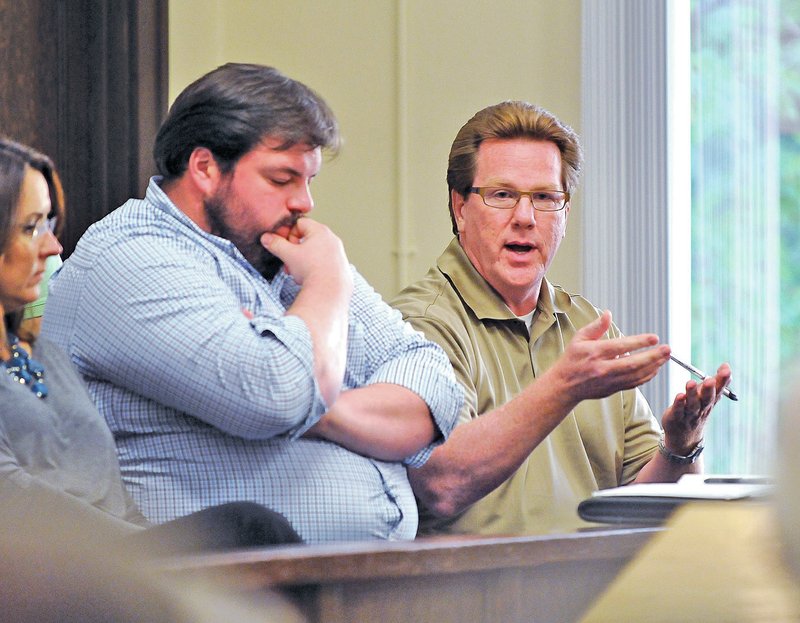BENTONVILLE -- Benton County justices of the peace said Tuesday they're still pondering how best to pay for rural ambulance service for the county.
A public hearing was held Monday on a proposed Emergency Medical Services District. The county also is considering a 0.2-mill property tax to all county residents. The Quorum Court is set to decide July 24 whether to send one or both plans on for a vote in November.
At A Glance
What’s Next
Benton County will consider two plans to pay for rural ambulance service at the July 24 Quorum Court meeting. The meeting is set for 6 p.m. in the Quorum Courtroom on the third floor of the County Administration Building, 215 E. Central Ave. in Bentonville.
Source: Staff Report
A majority of the people who spoke Monday favored the millage proposal. Several justices of the peace said they were inclined to support that plan.
Service to the unincorporated areas is provided by seven municipal fire departments and the Northeast Benton County Fire Department. The county has paid the cities from its reserve in the past.
Mike Crandall, accounting manager, estimated the district's $40 fee would raise about $527,868. A millage levy would raise about $833,981. The county could collect from both sources if both plans were approved.
The ordinances are written to allow the Quorum Court to reduce the fee or millage, but not to raise it without seeking another vote, said George Spence, county attorney. Revenue from either source would be dedicated to pay for ambulance service only.
Kevin Harrison of District 5 said he supports the millage. He thinks other city residents will too if they see the issue as he does.
"I don't have a problem paying that," he said. "If I go outside the city and need an ambulance it's worth $4, or for me it's $6. It's worth it to be sure that ambulance is available."
Susan Anglin of District 9 said she leans toward supporting the millage, but she isn't optimistic about either plan. The justices of the peace will spend some time debating the merits of the proposals before they make a decision, she said.
The county needs to put the question to the voters, Anglin said.
"We're at a point where we have to see what the people think about one or both options," she said. "As far as the question of what would you cut, it's mind-boggling. We have to do something if we're going to fund ambulance service. At the end of the day it's going to cost the people something."
Joel Jones of District 7 said he's beginning to favor the millage proposal over the EMS district. He sees the issue as a countywide question.
"It's all about the question of availability," he said. "We're all county residents and we all drive in unincorporated Benton County. I think we should all be willing to pay to have the service available if we need it."
Jones is working on a presentation he hopes will persuade voters the service is something they should support.
"I can't go out and talk to every voter in my district, it's near impossible," he said. "What I want to put together is something showing what the problem is and what the solutions are, what the fee or millage is and what would it mean to each individual. We have to get people talking about it. That can spread the word better than any one person."
Shirley Sandlin of District 8 thinks the county should put the fee and the millage plans on the ballot and let voters choose. She said she's heard nothing from her constituents. Her district is mostly made up of Bentonville residents.
The justices of the peace will have a large task informing and persuading city voters to tax themselves, Sandlin said. Part of the campaign should include information on the budget and cuts in other services if the measures fail, Sandlin said.
"The money is not there yet and you can't plan on it," she said. "So I would say we are going to have to suck it up and make the cuts. If everybody wants ambulance service and nobody wants to pay for it then there's going to be budget cuts. I think it's not a bad idea if it's made known that if the money is not there then this service or that service is going to be cut."
Kurt Moore of District 13 agreed the millage may be favored by most rural residents, but any vote will be decided by city residents.
"The job of educating the people in the cities will be pretty gargantuan," he said. "I think the prospects of the 0.2 mills are better than the $40 fee. The people in the county would overwhelmingly support it. We just have to show the people in the cities why they should. All the money they pay, plus all the money the county folks pay, would go back to their cities. It would help to pay for additional equipment or personnel or whatever else they may need for their ambulance service. It's pretty much a win-win situation once you explain it to them. But getting the message out is going to be tough."
The county will have to go into its budget work with an eye toward making cuts to pay for ambulance service, Moore said. If either or both plans are approved the funding can be restored much more easily than cuts can be made once the budget is completed, he said.
Budget cuts will affect both city and rural residents, another reason voters need to consider the funding plan carefully, Moore said.
"Certainly the cuts are going to be broad and universally painful," he said. "I think people are going to have to understand they're going to have to pay for it one way or another."
NW News on 07/16/2014
